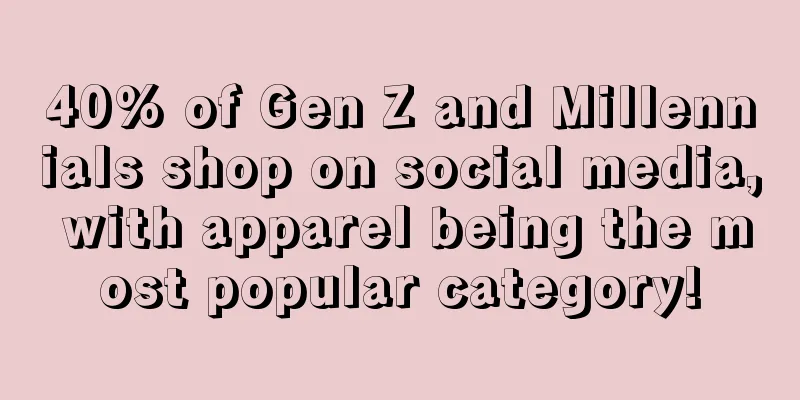40% of Gen Z and Millennials shop on social media, with apparel being the most popular category!

|
The Influencer Marketing Factory released the "Social E-Commerce Status Report" last month. Let's take a look at the development of social e-commerce! Let’s first clarify the concept of social commerce. Social commerce refers to the process of selling products directly on social media, where consumers can complete the entire shopping process from product discovery and research to checkout without leaving the platform. From the perspective of the entire market size, eMarketer predicts that total social e-commerce sales in the United States will increase by 34.8% in 2021 to US$36.09 billion, accounting for 4.3% of total US e-commerce sales. In addition, a survey conducted by eMarketer in January showed that the number of social e-commerce buyers in the United States increased by 25.2% in 2020 to 80.1 million, and is expected to increase by another 12.9% to 90.4 million by 2021. The Influencer Marketing Factory’s study of 350 American Gen Z and Millennials found that almost half ( 40%) of Gen Z and Millennials have purchased products they had previously seen on social media apps or live broadcasts . 60% of Gen Z and Millennials have purchased something after seeing content posted by an influencer , and 46% of Gen Z and Millennials say they make at least one purchase on social media per month . Despite the convenience of shopping on social apps , Generation Z likes to save specific items first and research brands and products before purchasing them. About 53% of respondents said they like to carefully research the products they buy online before buying . Additionally, approximately 61% said they prefer the “add to cart” option for shopping on social media , while 39% still prefer redirecting to a third-party website. Apparel ( 41%) leads the pack when it comes to the top items purchased on social channels , followed closely by beauty products ( 23%), followed by technology and home products.
It is worth noting that the younger generation prefers online shopping . Sellers should also pay more attention to the younger generation's social media usage preferences and consumption needs, such as their preference to interact with brands. In summary, major social media platforms are actively promoting the development of e-commerce. The development prospects of social e-commerce are still relatively promising, and sellers can also pay more attention to this area. Social e-commerce Generation Z Millennials |
<<: Indonesian platform Blibli holds Ramadan shopping festival, offers two-hour delivery service
Recommend
Target offers $24 an hour due to labor shortage
According to foreign media reports, workers in Ta...
"Smart Home" is very popular in the Russian market!
The continuous development of science and technol...
What is backstructure? backstructure Review, Features
Backstructure 's main business is the sale of ...
What is Tribal Credit? Tribal Credit Review, Features
Tribal Credit is designed for startups and growin...
Sales of beauty and health products in Russia increased by 16%
As Russia's epidemic control measures are gra...
What is suchprice? suchprice Review, Features
suchprice is committed to collecting international...
Another e-commerce platform in the United States is facing bankruptcy, and is the blame directed at Amazon?
The overseas market has been cold this year, with...
Total transaction volume exceeds 80 trillion! The Korean e-commerce market is seriously biased towards giants
The Korean e-commerce market is increasingly tilt...
What is ConnectBooks? ConnectBooks Review, Features
ConnectBooks automates accounting for Amazon, Wal...
Big deal! Lechuang Holdings spends nearly 30 million yuan to encourage employees
In recent months, the cross-border e-commerce ind...
Cross-border big-selling suppliers such as Anker and Dreame Technology failed to be acquired
For enterprises, when they develop to a certain s...
The number of lawsuits has tripled! Amazon is cracking down on sellers of counterfeit goods in China and the EU
Recently, Amazon released its 2021 Brand Protecti...
A group of Chinese sellers with monthly income of millions of dollars had their accounts blocked
"Although the account blocking phenomenon in...
What is Yuanrong Huitong? Yuanrong Huitong Review, Features
Yuanrong Huitong (Shenzhen Yuanrong Huitong Cross-...
Zhang Kuo of Alibaba International Station accepted an exclusive interview with Bloomberg: B2B trade is the most perfect application scenario for AI
Nowadays, B2B foreign trade is becoming a topic m...









